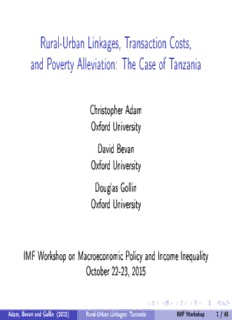
Rural-Urban Linkages, Transaction Costs, and Poverty Alleviation PDF
Preview Rural-Urban Linkages, Transaction Costs, and Poverty Alleviation
Rural-Urban Linkages, Transaction Costs, and Poverty Alleviation: The Case of Tanzania Christopher Adam Oxford University David Bevan Oxford University Douglas Gollin Oxford University IMF Workshop on Macroeconomic Policy and Income Inequality October 22-23, 2015 Adam,BevanandGollin (2015) Rural-UrbanLinkages: Tanzania IMFWorkshop 1/45 Rural-Urban Linkages, Transaction Costs, and Poverty Alleviation Adam,BevanandGollin (2015) Rural-UrbanLinkages: Tanzania IMFWorkshop 2/45 Outline 1 Background and Motivation 2 Model 3 Quantitative Experiments 4 Conclusions Adam,BevanandGollin (2015) Rural-UrbanLinkages: Tanzania IMFWorkshop 3/45 Background: Agriculture and Non-Agriculture Across sub-Saharan Africa, large fractions of the labor force work in agriculture. (cid:73) 75% for Tanzania Agricultural sector appears to have low productivity, relative to non-agriculture, typical of other countries in Africa. (cid:73) Agriculture share of value added is 45% in Tanzania. Implies raw (cid:16)agricultural productivity gap(cid:17) VAN/LN is large: 3.5 VAA/LA Adam,BevanandGollin (2015) Rural-UrbanLinkages: Tanzania IMFWorkshop 4/45 Background: Poverty Poverty is relatively concentrated in rural areas. (cid:73) Headcount poverty rate in Dar es Salaam is one-third as high as in more remote districts. (cid:73) Under-5 mortality rates four times higher in rural districts compared to urban districts. (cid:73) Only 3% of rural households have electricity compared to 45% of mainland urban households. But there are also signi(cid:28)cant numbers of poor people in urban areas. (cid:73) Concentrated in informal services and low-skill labor. Adam,BevanandGollin (2015) Rural-UrbanLinkages: Tanzania IMFWorkshop 5/45 Background: Transport Costs Tanzania is a country with poor roads and transport infrastructure. Correspondingly large costs of moving goods across space. (cid:73) Not all costs are transport costs; poor infrastructure and low population density also lead to low levels of competition. Markets across Tanzania are reasonably well integrated, but with large price di(cid:27)erences across locations at a moment in time. Adam,BevanandGollin (2015) Rural-UrbanLinkages: Tanzania IMFWorkshop 6/45 Price Dispersion across Markets Table 1: Cross-location price spreads, selected commodities: (Max - Min)/Average across 20 locations in Tanzania (CPI data). Dec. 2001 - Jan. 2004 - Jan. 2007 - Dec. 2001 - Dec. 2003 Dec. 2006 Dec. 2009 Dec. 2009 Food items Beans 0.647 0.641 0.579 0.619 Dried Fish 1.161 1.435 1.309 1.318 Rice 0.620 0.469 0.491 0.516 Maize Flour 0.877 0.841 0.710 0.802 Non-food items Men’s Trousers 1.050 1.092 1.032 1.059 Toothpaste 1.231 1.439 1.674 1.473 Torch Battery 0.225 0.423 0.833 0.524 Car Battery 0.342 0.546 0.810 0.591 Adam,BevanandGollin (2015) Rural-UrbanLinkages: Tanzania IMFWorkshop 7/45 Investment for Poverty Alleviation Against this background, how should the public sector invest to achieve poverty alleviation? Will investments in rural areas reduce poverty? Or are rural areas intrinsically poor? (cid:73) Farm size is very small and skill levels are low. (cid:73) Earnings of the rural poor are essentially determined by unskilled wage plus some land rents... Is it plausible to increase land rents su(cid:30)ciently to reduce poverty among households that farm 2 ha of land? Adam,BevanandGollin (2015) Rural-UrbanLinkages: Tanzania IMFWorkshop 8/45 Approach and Methodology To address these questions, need a model in which we can think about labor markets and skill types (di(cid:27)erentiated labor). Also need a model that can represent the spatial disparities in well-being that we observe in the data. (cid:73) A model with di(cid:27)erent locations (cid:73) Explicit frictions in moving goods across space Government policy will consist of allocations of public capital. (cid:73) Must be (cid:28)nanced in some way within the model. General equilbrium approach: bene(cid:28)ts from investments may not accrue to sectors where we invest. Adam,BevanandGollin (2015) Rural-UrbanLinkages: Tanzania IMFWorkshop 9/45 Antecedents We draw on the more stylized model of Gollin and Rogerson (2012), which has three locations: urban, (cid:16)close,(cid:17) and (cid:16)remote.(cid:17) (cid:73) Related to growing literature on remoteness; e.g., Minten and Stifel (2008). Also related to previous CGE approaches for Tanzania; e.g., Pauw and Thurlow (2010), Thurlow and Wobst (2003). Pays explicit attention to (cid:28)nancing of investment, as in Adam and Bevan (2006) or Devarajan et al. (1994). Adam,BevanandGollin (2015) Rural-UrbanLinkages: Tanzania IMFWorkshop 10/45
Description: